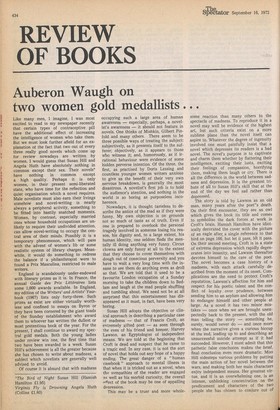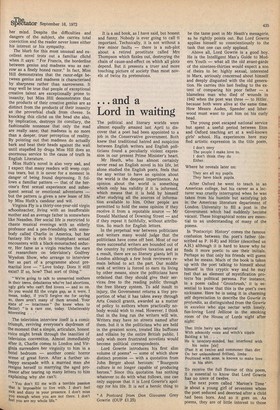Auberon Waugh on
two women gold medallists. • •
Like many men, I imagine, I was most excited to read in my newspaper recently that certain types of contraceptive pill have the additional effect of increasing the intelligence of women who take them. But we must look further afield for an explanation of the fact that two out of every three really good novels which come up for review nowadays are written by women. I would guess that Susan Hill and Angela Huth have absolutely nothing in common except their sex. Their novels* have nothing in common except a high quality. Perhaps it is only women, in their present semi-liberated state, who have time for the reflection and quiet organisation which a novel requires. Male novelists must also earn their livings somehow and novel-writing is nearly always a peripheral activity, something to be fitted into hastily snatched moments. Women, by contrast, especially married ones whose household occupations are unlikely to require their undivided attention. can allow novel-writing to occupy the central area of their minds. Possibly it is a temporary phenomenon, which will pass with the advent of women's lib or some realistic system of library charges. Meanwhile, it would do something to redress the balance if a philanthropist were to found a Prix Masculina, restricted to male writers.
England is scandalously under-endowed with literary prizes as it is. In France, the annual Guide des Prix Litteraires lists some 1,000 awards available. In England, my edition of the Writers' and Artists' Yearbook (1967) lists only forty-three. Such prizes as exist are either virtually worthless and confined to essays on Byron or they have been cornered by the giant toads of the Sunday establishment who award them to whoever has written the dullest or most pretentious book of the year. For the present, I shall continue to award my spectral gold medals. Both the young ladies under review win one, the first time that two have been awarded in a week. Susan Hill's achievement is all the greater because she has chosen to write about madness, a subject which novelists are generally well advised to avoid.
Of course it is absurd that with madness The Bird of Night Susan Hill (Hamish Hamilton £1.95) Virginia Fly is Drowning Angela Huth (Collins £1.80) occupying such a large area of human awareness — especially, perhaps, a novelist's awareness — it should not feature in novels. One thinks of Mishkin, Gilbert Pinfold and many others. There seem to be three possible ways of treating the subject: subjectively, as it presents itself to the sufferer; objectively, as it appears to those vino witness it; and, humorously, as if irrational behaviour were evidence of some hidden perverse intention. Of the three, the first, as practised by Doris Lessing and countless younger women writers anxious to give us the benefit of their very own nervous breakdown, is generally the most disastrous. A novelist's first job is to hold the audience's atention, and nothing in the world is so boring as purposeless incoherence.
'Nowadays, it is thought tasteless to describe the antics of the mad as if they were funny. My own objection is on grounds not so much of taste as of truth. Even if one is prepared to overlook the personal tragedy involved in someone losing his reason, his dignity and, to a large extent, his human identity, one seldom finds the mentally ill doing anything very funny. Circus clowns are only funny at all to the extent that they choose to cover themselves with dough out of conscious perversity and you have to wait a very long time with the insane to see them do anything even as droll as that. We are told that it used to be a favourite London occupation of a Sunday morning to take the children down to Bedlam and laugh at the mad people shuffling and tumbling about. We need not be at all surprised that this entertainment has disappeared as it must, in fact, have been very boring.
Susan Hill adopts the objective or clinical approach in describing a particular case of madness — that of Francis Croft, an extremely gifted poet — as seen through the eyes of his friend and keeper, Harvey Lawson, an Egyptologist of independent means. We are told at the beginning that Croft is dead and suspect that he came to a tragic end. In any case, it is not the sort of novel that holds out any hope of a happy ending. The great danger of a "human casebook" approach to mental illness is that when it is tricked out as a novel, when the sympathies of the reader are engaged ac well as his morbid curiosity, the overall Pffect of the book may be one of appalling depression.
This may be a truer and more whole
some reaction than many others to the spectacle of madness. To reproduce it in a novel may well be evidence of the highest art, but such criteria exist on a more sublime plane than the novel itself can aspire to. Whatever the degree of ingenuity involved one must painfully insist that a novel which depresses its readers is a bad novel. The novel's purpose is to captivate and charm them whether by flattering their intelligence, exciting their lusts, exciting their feelings of compassion, horrifying them, making them laugh or cry. There is all the difference in the world between sadness and depression. It is the greatest tribute of all to Susan Hill's skill that at the end of the day we feel sad rather than depressed.
The story is told by Lawson as an old man, many years after the poet"s death. On their first encounter, they see an owl which gives the book its title and comes to symbolise the dark forces at work in Croft's brain. Hamish Hamilton have idiotically decorated the cover with the picture of an eagle after, a single reference to that bird on page 166, but let it pass, let it pass. On their second meeting, Croft is in a state of extreme depression which rapidly degenerates into insanity, and Lawson thereafter devotes himself to the care of the poet. The novel becomes a case history of a madness, with each attack carefully described from the moment of its onset. Complications are the need to protect Croft's reputation, Lawson's affection for him and respect for his poetic talent and the conflict of loyalty over prudence, between sending him to an asylum and allowing him to endanger himself and other people at large. As a novel it has two minor mistakes — once when we are brought unexpectedly back to the present, with the old man telling the story — something he, surely, would never do — and once more when the narrative gives a curious hiccup at the end, leading up to and describing an unsuccessful suicide attempt as if it had succeeded. However, I must admit that this pathetic false conclusion makes the brief, final conclusion even more dramatic. Miss Hill sidesteps various problems by putting the main action of her novel between the wars, and making both her main characters enjoy independent means. Her greatest virtue, and it is an overwhelming one, is an intense, unblinking concentration on the predicament and characters of the two people she has chosen to conjure out of her mind. Despite the difficulties and dangers of the subject, she carries total conviction and the reader never loses either his interest or his sympathy.
The blurb for this most unusual and excellent novel trots out a familiar cliché when it says: "For Francis, the borderline between genius and madness was as narrow as a finely honed razor." In fact, Miss Hill demonstrates that the razor-edge between genius and madness is characterised by sharpness rather than narrowness. It may well be true that people of exceptional creative talent are exceptionally prone to insanity, but Miss Hill demonstrates that the products of their creative genius are as distinct from the products of their insanity as the proverbial chalk from cheese. In knocking this cliché on the head she also, by implication, destroys its corollary, the fashionable nonsense that only the mad are really sane; that madness is no more than a deeper, truer perception of reality. By pointing out that madmen do actually bark and beat their heads against the wall until stupefied by drugs Miss Hill does an enormous service to the cause of truth in English Literature.
Miss Huth's novel is also very sad, and I expect that many readers will weep copious tears, but it is never for a moment in danger of being found depressing. It follows a familiar pattern — that of the heroine's first sexual experience and subsequent sexual or emotional adventures — but the pattern is given a new lease of life by Miss Huth's candour and wit.
Virginia Fly is a thirty-one-year-old virgin schoolteacher, living with an insufferable mother and an average father in somewhere like Neasden. Her social life is restricted to chaste musical evenings with an elderly professor and a pen-friendship with somebody called Charlie in America, but her fantasy life is rich in triumphant sexual encounters with a black-moustached seducer. Her fame as a virgin reaches the ears of researchers on television's Godfrey Wysdom Show, who arrange to interview her as part of a programme about premarital love — "Love today. Does it still exist? If so, how? That sort of thing."
"We're going to talk to unmarried mothers in their teens, debutantes who've had abortions, ugly girls who can't find lovers — and so on. So you would fill the virgin gap, as it were. I mean, today, if you'll forgive me for saying so, there aren't many of them around. Your state of — intactness" (he knew when to flatter) "is a rare one, today. Unbelievably interesting . • • The television interview itself is a comic triumph, reviving everyone's daydream of the moment that a simple, articulate, honest voice might break through the inanities of television convention. Almost immediately after it, Charlie comes to London and Virginia surrenders her virginity to him in a hotel bedroom — another comic horror scene of great force. After a further unhappy escapade with a married man she resigns herself to marrying the aged professor after tearing up many letters to him explaining why she can't: "You don't fill me with, a terrible passion that is impossible to live with. I don't feel sick and dizzy in your presence. I don't miss You enough when you are not there. I don't feel you are my whole life." It is a sad book, as I have said, but honest and funny. Nobody is ever going to call it important. Technically, it is not without a few minor faults — there is a sub-plot about a retired prostitute called Mrs Thompson which fizzles out, destroying the chain of cause-and-effect on which all plots depend. But it presents a truer and more touching picture of society than most novels of twice its pretensions.



































 Previous page
Previous page